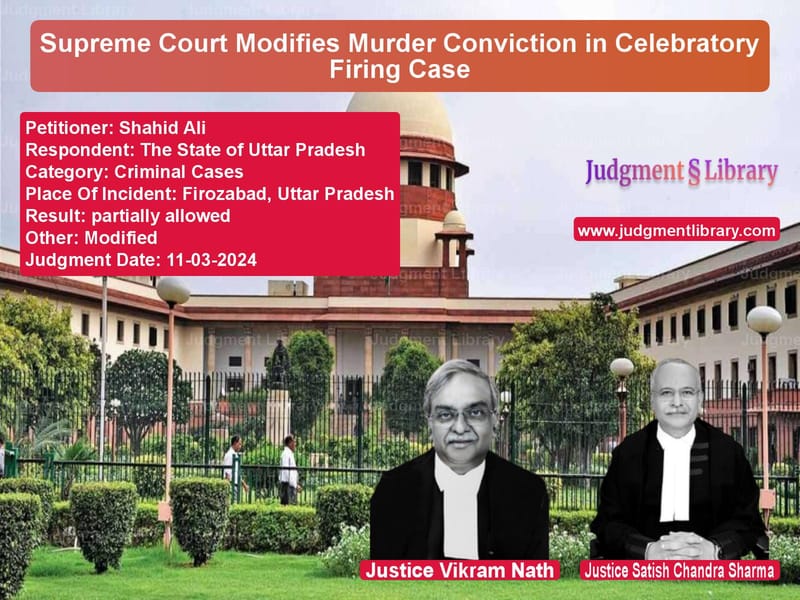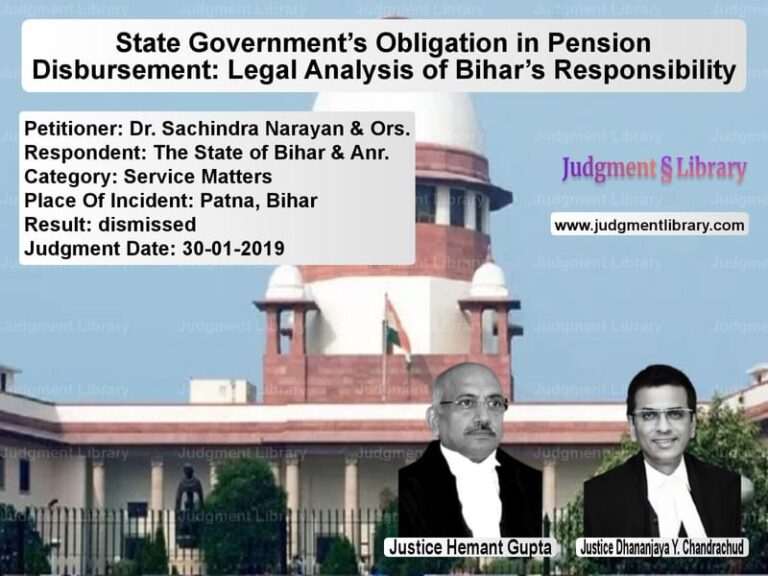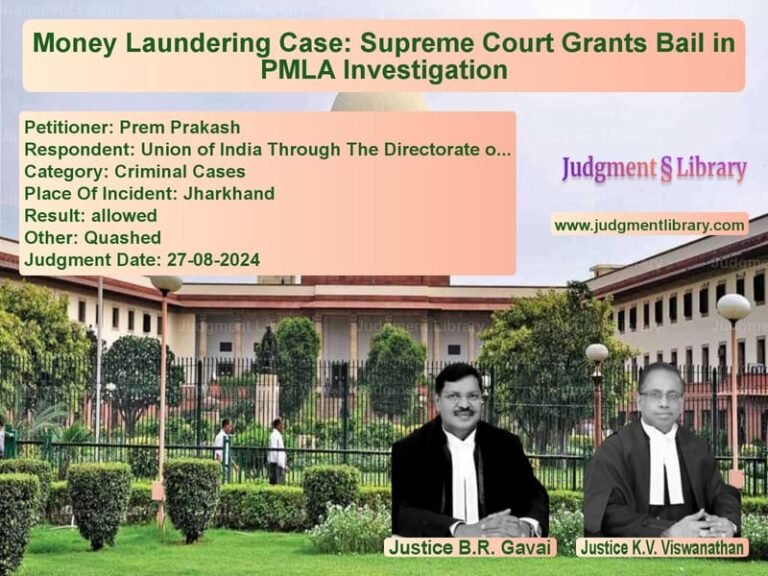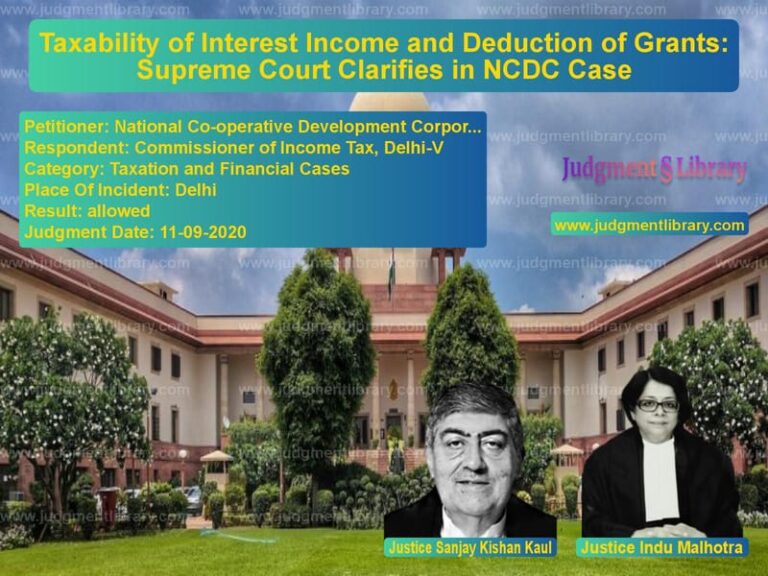Supreme Court Modifies Murder Conviction in Celebratory Firing Case
The Supreme Court of India recently modified the conviction of an individual involved in a case of celebratory firing at a wedding, reducing his charge from murder under Section 302 IPC to culpable homicide not amounting to murder under Section 304 Part II IPC. The case, Shahid Ali vs. State of Uttar Pradesh, revolved around an unfortunate death caused by a single gunshot during a wedding ceremony, leading to legal scrutiny over intent, negligence, and criminal liability.
The Supreme Court emphasized that, while celebratory firing is a reckless act, there was insufficient evidence to establish that the accused had the intent to murder. The Court, therefore, modified the life imprisonment sentence imposed under Section 302 IPC and reduced it to the period already undergone under Section 304 Part II IPC.
Background of the Case
The incident occurred on March 17, 2016, at a wedding ceremony in Firozabad, Uttar Pradesh. During the festivities, Shahid Ali, the appellant, allegedly fired a gunshot that fatally injured Ishfaq Ali, the victim. Witnesses initially claimed that the accused intentionally shot the deceased, but later, several of them turned hostile.
Based on the FIR lodged by the village chowkidar (PW1), the police registered a case under Section 302 IPC. Later, an additional case under Sections 25/27 of the Arms Act was also registered against Shahid Ali for possessing an illegal firearm.
Trial Court and High Court Proceedings
The Sessions Court convicted Shahid Ali on February 23, 2018, sentencing him to:
- Life imprisonment under Section 302 IPC with a fine of ₹10,000.
- Five years of rigorous imprisonment under Sections 25/27 of the Arms Act with a fine of ₹5,000.
On appeal, the Allahabad High Court upheld the conviction and sentence on April 4, 2019. The appellant then moved the Supreme Court, which admitted the appeal but limited its consideration to whether the conviction should be under Section 304 IPC (culpable homicide not amounting to murder) instead of Section 302 IPC (murder).
Arguments Presented
Appellant’s Arguments
- The firing was part of the wedding celebrations and was not intended to kill anyone.
- Several key prosecution witnesses turned hostile and contradicted their original statements.
- There was no proven enmity between the accused and the deceased.
- The bullet struck the victim accidentally due to negligent handling of the firearm.
State’s Arguments
- The appellant recklessly fired in a crowded gathering, leading to the victim’s death.
- The deceased died instantly due to a gunshot wound to the neck.
- The accused was in possession of an unlicensed firearm, which further indicated criminal liability.
- The trial court and high court had correctly found him guilty of murder.
Key Observations by the Supreme Court
The Supreme Court reviewed the evidence and highlighted the following key points:
- All eyewitnesses turned hostile, weakening the prosecution’s claim of intent to kill.
- The accused and deceased had no prior enmity, making a premeditated murder unlikely.
- The firing occurred during a wedding, suggesting it was reckless rather than intentional.
- There was no direct evidence proving that the accused aimed at the deceased.
Based on these factors, the Court concluded that while the accused was responsible for the death, his actions did not amount to murder under Section 302 IPC but instead fell under culpable homicide not amounting to murder under Section 304 Part II IPC.
Legal Precedents Cited
The Court relied on past judgments to support its decision:
- Kunwar Pal Singh vs. State of Uttarakhand (2014) 12 SCC 434 – Held that celebratory firing causing death may not amount to murder but can be culpable homicide.
- Bhagwan Singh vs. State of Uttarakhand (2020) 14 SCC 184 – Stated that accidental firing in a celebratory setting should be assessed differently from intentional killing.
Final Verdict
The Supreme Court ruled:
“In view of the totality of circumstances, the conviction and sentence under Section 302 IPC is set aside. The Appellant is convicted for an offence under Section 304 Part II IPC.”
Since Shahid Ali had already served approximately eight years in jail, the Court ruled that his sentence was equivalent to the time already undergone. The conviction under the Arms Act remained unchanged.
The Court ordered his immediate release unless required in any other case.
Conclusion
The judgment reinforces the legal distinction between murder and culpable homicide. It acknowledges the reckless nature of celebratory firing while ensuring that sentencing reflects the actual intent and circumstances. The ruling serves as a warning against the dangerous practice of indiscriminate firing at public gatherings, highlighting the tragic consequences of negligent firearm use.
Petitioner Name: Shahid Ali.Respondent Name: The State of Uttar Pradesh.Judgment By: Justice Vikram Nath, Justice Satish Chandra Sharma.Place Of Incident: Firozabad, Uttar Pradesh.Judgment Date: 11-03-2024.
Don’t miss out on the full details! Download the complete judgment in PDF format below and gain valuable insights instantly!
Download Judgment: shahid-ali-vs-the-state-of-uttar-p-supreme-court-of-india-judgment-dated-11-03-2024.pdf
Directly Download Judgment: Directly download this Judgment
See all petitions in Murder Cases
See all petitions in Judgment by Vikram Nath
See all petitions in Judgment by Satish Chandra Sharma
See all petitions in partially allowed
See all petitions in Modified
See all petitions in supreme court of India judgments March 2024
See all petitions in 2024 judgments
See all posts in Criminal Cases Category
See all allowed petitions in Criminal Cases Category
See all Dismissed petitions in Criminal Cases Category
See all partially allowed petitions in Criminal Cases Category







